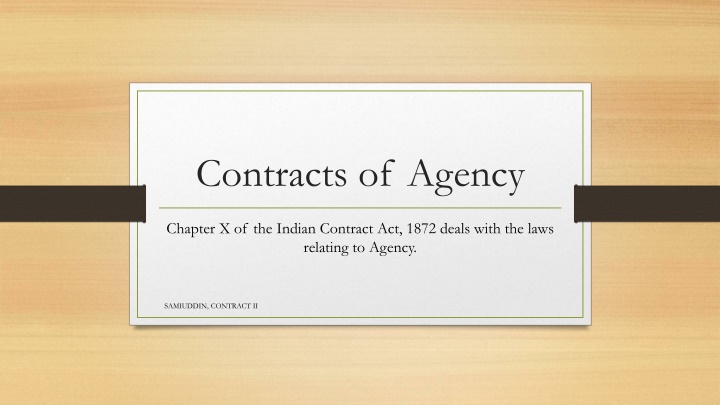
Laws of Agency in Indian Contract Act 1872
Learn about the laws relating to agency under Chapter X of the Indian Contract Act 1872, which governs relationships between principals, agents, and third parties. Discover who can act as a principal or agent, and the legal implications of agency relationships in business transactions.
Download Presentation

Please find below an Image/Link to download the presentation.
The content on the website is provided AS IS for your information and personal use only. It may not be sold, licensed, or shared on other websites without obtaining consent from the author. If you encounter any issues during the download, it is possible that the publisher has removed the file from their server.
You are allowed to download the files provided on this website for personal or commercial use, subject to the condition that they are used lawfully. All files are the property of their respective owners.
The content on the website is provided AS IS for your information and personal use only. It may not be sold, licensed, or shared on other websites without obtaining consent from the author.
E N D
Presentation Transcript
Contracts of Agency Chapter X of the Indian Contract Act, 1872 deals with the laws relating to Agency. SAMIUDDIN, CONTRACT II
INTRODUCTION When one party delegates some authority to another party whereby the latter performs his actions in a more or less independent fashion, on behalf of the first party, the relationship between them is called an agency. Agency can be express or implied. Chapter X of the Indian Contract Act, 1872 deals with the laws relating to Agency. It is important to know the law relating to agency because nearly all business transactions worldwide are carried out through agency. All corporations, big or small, carry their work out through agency. Therefore, laws relating to the agency are an important area of Business Law. Relationships relating to principal and agent involve three main parties: The Principal, the Agent, and a Third Party. An agent does not act on his own behalf but acts on behalf of his principal. He either represents his principal in transactions with third parties or performs an act for the principal. The question as to whether a particular person is an agent can be verified by finding out if his acts bind the principal or not. SAMIUDDIN, CONTRACT II
Who is a Principal? According to Section 182, The person for whom such act is done, or who is so represented, is called the principal . Therefore, the person who has delegated his authority will be the principal. Illustrations: A, a businessman, delegates B to buy some goods on his behalf. Here, A is the principal and B is the agent, and the person from whom the goods are bought is the ThirdPerson . Joe appoints Mary to deal with his bank transactions. In this case, Joe is the Principal, Mary is the Agent and the Bank is the Third Party. Lavanya lives in Mumbai, but owns a shop in Delhi. She appoints a person Susan to take care of the dealings of the shop. In this case, Lavanya has delegated her authority to Susan, and she becomes a Principal while Susan becomes an agent. SAMIUDDIN, CONTRACT II
Who can appoint an Agent? According to Section 183, any person who has attained the age of majority and has a sound mind can appoint an agent. In other words, any person capable of contracting can legally appoint an agent. Minors and persons of unsound mind cannot appoint an agent. SAMIUDDIN, CONTRACT II
Who may be an Agent? In the same fashion, according to Section 184, the person who has attained the age of majority and has a sound mind can become an agent. A sound mind and a mature age is a necessity because an agent has to be answerable to the Principal. Principal is liable for the acts of agent. The principal is liable for all the acts of an agent which are lawful and within the scope of agent s authority. The contracts entered into by the agent on behalf of the principal have the same legal consequences as if these contracts were made by the principal himself. SAMIUDDIN, CONTRACT II
Who may employ an agent? Who may employ an agent? Any person may employ an agent if He is of the age of majority; and He is of sound mind. SAMIUDDIN, CONTRACT II
Who can be an agent? Any person may become an agent. Even a minor or a person of unsound mind can become an agent. SAMIUDDIN, CONTRACT II
Liability of agent Generally, an agent is liable to the principal. An agent is not liable to the principal if he is a minor or is of unsound mind. SAMIUDDIN, CONTRACT II
Requirement of consideration No consideration is necessary for creating an agency.(Section 185) SAMIUDDIN, CONTRACT II






















